- Home
- Carolyn Keene
Cold as Ice Page 2
Cold as Ice Read online
Page 2
Nancy had been admiring Rob’s jacket, which was dark purple wool with orange leather sleeves and crossed oars embroidered in white on the back. She tugged on Ned’s arm so that they could catch up to Rob. She decided to talk with him.
“This campus is beautiful, even at night,” Nancy commented, sandwiched between the two boys. “I feel as if I’ve walked into a photo on a greeting card.”
Rob laughed. “I hardly notice anymore. I guess when you’re in a place all the time, you stop really seeing it. It takes a visitor to make you appreciate it.”
“That’s quite a jacket you’ve got on,” Nancy said. “Those oars on the back—they mean that you’re a rower, right?”
Rob shoved his gloved hands in his jacket pockets. “Sort of,” he said gruffly. He hesitated, then added, “I got the jacket after the regional regatta last year. That’s the biggest crew race of the year. I pulled third oar in the boat that won the finals.”
“Really? That’s terrific,” Nancy said. “You must have been proud.”
“Yeah,” he mumbled. It was clear that something was upsetting him and that he didn’t want to continue their conversation. Nancy remembered how Susan had warned them about Rob. Could it have something to do with his rowing? She decided to ask Ned about it when they were alone.
When they reached the modern, cubelike museum building, they pushed through the huge metal doors.
“Not too shabby,” Ned commented, studying a poster of an emerald bracelet by the entrance.
“Oh, it’s gorgeous! Wouldn’t it look great on me?” Bess said, holding out her wrist.
George gave her cousin a gentle push. “Come on, we’re here to look and admire, not to take.”
“The speeches are beginning,” Ned said, pointing to a microphone set up at the far end of the entrance hall. A tall, thin man wearing a green turtleneck under a heavy tweed jacket was tapping on the mike.
“That’s Mr. Fantella, the director of the museum,” Ned whispered to Nancy.
“I’d like to welcome everyone to this marvelous exhibition,” the museum director began. “I know you are eager to see this astonishing collection of historic jewels, but first I would like to introduce and thank the man who made this exhibition possible. Mr. William Whorf is a noted collector and expert on historic jewelry. He is also a trustee and generous friend of Emerson College. Mr. Whorf?”
As Nancy and the other spectators applauded, a heavyset man with a round face and wavy gray hair stepped forward. Light sparkled from a diamond ring on his little finger and a diamond stickpin in his necktie. The museum director wasn’t kidding when he said Whorf likes to collect jewelry, Nancy thought.
“Thank you,” Mr. Whorf said. “And don’t worry, I’m not going to make a speech. I just want to ask you to remember, as you look at this exhibition, that each and every item is unique, either because one of the world’s most talented and renowned jewelers designed and made it, or because great figures in history, such as Queen Victoria of England, Catherine the Great of Russia, and Otto von Bismarck of the German Empire, owned and wore them. They are not just beautiful works of art, but a testament to some of the great figures in European history.”
After another polite round of applause, the doors to the exhibit were opened. There were too many people crowded around the first few showcases for Nancy or her friends to see anything.
“Follow me,” Rob said. “I know a shortcut to the other end of the exhibit. We can work our way backward.”
“Ohhh,” Bess said, leaning over one of the last glass display cases. “I’ve never seen anything so beautiful!”
Resting on a cushion of black velvet were a matched necklace, bracelets, and earrings of deep, red rubies and glittering diamonds. The rubies were larger than any Bess had seen before. They were set in gold filigree with dozens of diamonds around them.
Glancing at the typed card next to the jewelry, Nancy said, “They used to belong to the Empress of Austria. Now they’re in the collection of a museum in Vienna.”
“What a shame,” Bess said. “They were meant to be worn, not to sit in some cold, dusty museum. I wish I could take them home.”
“Be sensible,” George said. “Where would you wear something like that if you had it?”
Bess tossed her head. “I’d put them on at home and look in the mirror.” She laughed. “Then I guess I’d give them back to the museum. I couldn’t begin to afford the insurance premiums on them!”
As Bess leaned over for a closer look at the jewels, Nancy noticed the guard straightening up and moving slowly in their direction.
“I’d be glad to get them for you,” Jerry joked, “but I’d never get away with it. The museum just put in a super new electronic alarm system.”
“That shouldn’t stop us,” Rob said, bending over for a closer look at the case. “Anyone who knows about electronics could get past the system. I bet if you gave me ten minutes I could walk out of here with that stuff. Maybe less— maybe only five minutes.”
Nancy glanced up to see the guard only a few feet away. He was listening hard and studying Rob’s face as if he were trying to memorize it.
“Better watch what you say,” Nancy cautioned Rob in an undertone. “I think that guard is taking you seriously.”
“Oh, look,” George said, pointing to a case on the far wall. “Jeweled armor! I wonder who it belonged to.”
“Some guy who cared more about his looks than about winning fights,” Rob quipped.
After a half hour the six friends found themselves back in the entrance hall. “It’s a great show,” Bess said, “but I don’t think I can look at another brooch or goblet.”
“Me, too,” George agreed. “Can you imagine the fortunes people spent on all that jewelry? It’s amazing.”
“I guess we’d better head back to our dorm. Even though it’s still early, I’m tired from the long drive and the cold,” Nancy said.
The walkway from the museum to the dorms was flanked by evergreens. Nancy and Ned followed the others, their feet crunching on the hard, packed snow. She made sure she and Ned were out of the others’ hearing range. “Rob seemed down when I asked him about rowing earlier. Is something wrong?”
“Rob’s always been a gung-ho oarsman. He probably did more than anyone else to raise money for the new rowing tank. Tomorrow’s dedication ceremony is a big deal for him.”
“Then why isn’t he excited?” Nancy asked.
“He got a letter from the dean last week. Because of his grades, he’s been put on academic probation and suspended from crew.”
“Oh, the poor guy!” Nancy exclaimed.
“He’s pretty bitter, too,” Ned said. “He got letters from his professors this term saying his work had improved, but the dean wouldn’t budge. Rob’s going to miss the spring season and the big regatta in May. It’s a raw deal, if you ask me.
“No wonder he didn’t want to talk when I asked about his jacket,” Nancy said. “I must have made him think about everything he’s going to miss.”
Ned shook his head. “Don’t blame yourself, Nan. He thinks about it all the time anyway.”
After saying good night to the guys, Nancy, Bess, and George went upstairs to Susan’s room.
“I guess Susan’s still out,” Bess said, seeing that the room was empty.
“It was really nice of her to let us stay here,” George commented as she and Bess rolled out their sleeping bags on the floor.
Nancy draped her parka over the back of the desk chair, then began to go through her bag for her nightgown. “I hope she doesn’t feel uncomfortable having us here now that she knows we’re friends with Rob.”
“It’s not like we’re on anyone’s side or anything,” Bess added.
“Mmmm.” As they drifted off to sleep, Nancy thought ahead to the next couple of days. She was thrilled to have a few days of fun with no case to worry about.
• • •
“Dedication is one thing,” Bess said, shivering as she added a handfu
l of snow to her snow castle. “But nobody said anything about getting up at seven in the morning!”
“Oh, come on. It wasn’t that bad,” George said. Her cheeks were bright red and her breath made a cloud in the early morning air. She was concentrating on keeping a thick, snowy wall of her fort from falling down.
“Ned said there’s a lot going on today. This might be the only chance we have to work on these.” She glanced at her watch. “He and Rob and Jerry ought to be here any minute.”
A snowball hit Nancy in the back, and she whirled around to see Ned and the others coming toward them.
“Okay, Nickerson, you asked for it,” Nancy threatened, bending to grab some snow.
He put up his hands and made a face of mock horror. “No, don’t! I give up.”
“Cut it out, you guys,” Rob said in a serious voice. “We have to get going if we don’t want to be late for the boat house dedication.”
The girls brushed the snow from their gloves, and they all set off on the snow-covered path that curved around the lake to the boat house.
It was warm inside the new cement addition, so they took off their jackets, piling them up with others on a table against one wall. Nancy studied the addition. It was a big square room enclosing what looked like a shallow swimming pool. Fixed in the center of the pool was the middle section of a racing shell, with eight seats for the oarsmen and one seat, facing forward, for the coxswain.
Nancy was going to ask Rob a question, but he was staring moodily down at the floor at the end of their row.
“It has recirculating pumps,” Jerry was explaining to George. “It’s supposed to feel as though you’re rowing on a real lake or river. You can even adjust the speed of the current.”
“Oops,” Bess said, “I think I see some more speeches coming.” She nodded toward a group that had just come in. Nancy recognized Garrison Butler, the president of Emerson College.
After welcoming the audience, President Butler turned the microphone over to the crew coach. Nancy found herself tuning out his speech, until a familiar name caught her attention.
“To Rob Harper, who went on believing in this dream when the rest of us were ready to give up. Where are you, Rob? Take a bow.”
Nancy looked at the end of their row, but the chair where Rob had been sitting was empty. Where was he? He must have slipped away. Under the circumstances, Nancy couldn’t blame him.
“I’ll pass on our appreciation to Rob the next time I see him,” the coach continued. “Finally, I’d like to thank one of our most steadfast supporters, a great sportsman, and one of our crew team’s biggest fans, Mr. William Whorf.”
As Whorf stepped forward and waved, George leaned over and whispered to Nancy, “If this guy keeps up his donations, Emerson will probably be changed to Whorf College before long.”
Nancy chuckled but stopped when someone behind them said, “Shh!”
The coach was announcing that the junior varsity crew would demonstrate the new tank. As nine guys wearing sweatpants and shirts bearing the Emerson emblem clambered into the shell, Nancy sniffed the air, frowned, and looked around her. A few feet away was a door that must lead into the old part of the boat house. From under the bottom edge of the door came a few thin wisps of gray smoke. As she looked, the wisps thickened and darkened, and an acrid smell reached her nostrils.
“Fire!” someone near her shouted. “Fire!”
Chapter
Three
THE AUDIENCE LEAPT to their feet as frantic cries echoed back and forth in the big room. Someone a few rows over let out a single bloodcurdling scream. Someone else gave Nancy a shove that almost knocked her off her feet. Fear and panic rippled through the crowd, and Nancy knew that could be as dangerous as the fire itself. Keeping her voice steady, she began to direct people to the exit. Gradually, people calmed down a little and started toward the outside door.
“Stick together,” Nancy told her friends in an urgent tone. Ned was right behind her, his arm linked with Jerry’s. Bess, looking pale, took Nancy’s and George’s arms.
“Everybody, remain calm,” the amplifier boomed. President Butler had grabbed the microphone. “Just proceed to the exit in an orderly fashion and everybody will be safe.”
People had stopped shoving and were moving in an orderly fashion toward the open door. The members of the crew, easy to recognize in their Emerson sweats, had lined up near the door to direct traffic.
After what seemed like forever, Nancy found herself outside. Taking a deep breath, she looked around. “Where’s Rob?” she asked.
“He left earlier,” Bess replied. “All of a sudden he just got up and stormed away. He looked pretty upset.”
Nancy quickly explained about Rob’s having been suspended from the crew, then turned her attention back to the fire. Smoke was rising into the air from the older part of the building, but it looked as though it was coming from just one window. She didn’t see any flames.
In the distance sirens wailed. A handful of campus police had arrived and moved the crowd farther from the building.
“Let’s go around to the front of the boat house,” Nancy said. “There’s something about this fire that doesn’t feel right to me.”
“What do you mean?” demanded Jerry.
“The timing,” Nancy told him. “Does it seem like a coincidence that the fire broke out right in the middle of the dedication ceremony?”
Two fire engines roared up and stopped in front of the boat house. A pair of fire fighters dragged a hose, while others, wearing breathing masks, attacked the nearest set of doors with axes and crowbars before rushing in with foam extinguishers.
Black smoke billowed out the open doors, causing the crowd of spectators to back up. As Nancy watched, the smoke changed to gray, then to white. A few seconds later two fire fighters armed with long pikes dragged a smoldering mass out the door and threw it on the lawn before spraying it with foam.
“That was the fire?” Bess said. “What is it?”
“It looks like some kind of cloth,” George said as the fire fighters used their pikes to spread out the red-hot pile. “Towels or something.”
Nancy frowned. “I never heard of towels catching fire all by themselves,” she remarked. She was becoming more and more positive that her suspicions about the fire were correct.
A man in a fire chief’s uniform spoke to two of the fire fighters before joining President Butler.
“I’ll be right back,” Nancy murmured to Ned. She edged her way through the crowd until she was within hearing distance of the college president and the fire chief.
“We’ll have to wait for the results of our investigation,” the fire chief was saying. “But unofficially, I don’t think there’s any question about it. This was arson.”
Nancy nodded. She had been right—someone had set the fire on purpose.
“That’s terrible,” Butler exclaimed. “We could have had a real tragedy on our hands.”
“Yes, sir. Though if I’m right, I don’t think the perpetrator meant to do much damage. The fire was more of a gesture. But like most people, he might not have realized that the worst danger is from smoke. We could have had a very deadly situation on our hands.”
President Butler took a deep breath. “Well, thank you, Chief Culliver. I appreciate the information. You’ll keep me informed?”
“Of course.” The chief turned and went into the boat house.
Nancy returned to her friends. “I was right about the fire,” she announced.
“You mean somebody deliberately set it?” George demanded, her dark eyes open wide. “Why would anyone do such a thing?”
“I don’t know,” Nancy answered. “But it seems pretty clear that whoever did it intended to disrupt the dedication ceremonies.”
“It must have been some nut,” Jerry put in. “You don’t try to burn down a building full of people just because you got out of bed on the wrong side.”
Nancy shrugged her shoulders. Suddenly she realized th
at she was freezing, and she rubbed her arms vigorously.
“Need this?” Ned asked, holding out her parka. “One of the fire fighters brought our jackets out while you were gone.”
Nancy put on her jacket, her mind still on the fire. “Whoever set it could be somebody who has a lot of resentment against the new building, or maybe against the college as a whole. Somebody who feels unfairly treated.” Somebody like Rob, she thought, but her instincts told her he wouldn’t have done it. She did have to admit that he had a motive—and the opportunity.
“I can’t imagine—” Bess began.
Just then Rob came running up and grabbed Ned’s arm. “What happened? What’s going on?” he demanded breathlessly.
“Where were you?” Ned said. “Did you miss the fire?”
Rob stared at him. “Fire? In the boat house? The shells! Were they damaged?”
Nancy watched him closely. He seemed genuinely surprised—and upset. “The fire chief says that there was hardly any damage,” she assured him.
“Thank goodness!” Rob said. He took a deep breath, then wiped his forehead. Nancy noticed he was damp with sweat in spite of the cold.
“You must be frozen,” Bess said sympathetically. “Where’s your jacket?”
Rob looked down at his sweater and frowned in confusion. “I guess I left it inside,” he said, glancing around vaguely. “I had to get out of there, so I went for a run. I didn’t think about my jacket. I guess I’d better go get it. I’ll catch you guys later.”
Now that the fire was obviously out, the crowd in front of the boat house began to disperse.
Jerry looked at his watch. “What now, gang? We’ve still got some time before lunch.”
“We could put in a little more work on our snow sculptures,” Nancy suggested.
“Good idea,” agreed Bess. “Mine needs some serious work. Every time I think I’m getting somewhere, part of it flakes off.”
“That’s why they’re called snowflakes,” Jerry quipped, causing the others to groan.
A few people were working on their sculptures when Nancy’s group returned. One of them was Susan, who was sculpting a mound that resembled a car or sled.

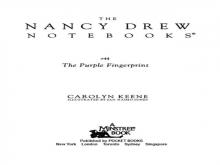 The Purple Fingerprint
The Purple Fingerprint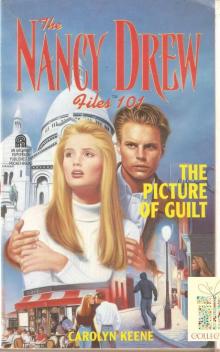 The Picture of Guilt
The Picture of Guilt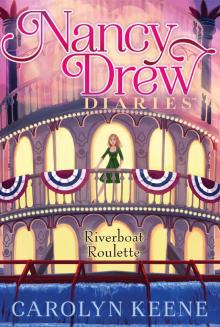 Riverboat Roulette
Riverboat Roulette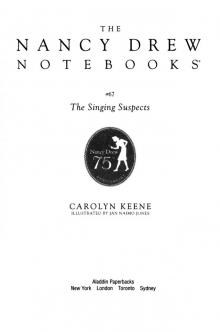 The Singing Suspects
The Singing Suspects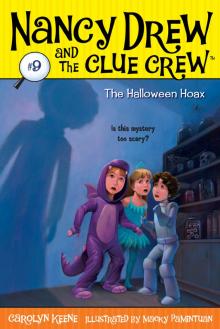 The Halloween Hoax
The Halloween Hoax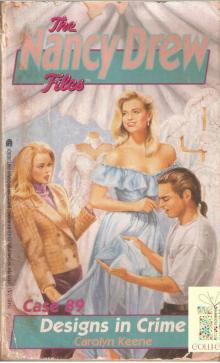 089 Designs in Crime
089 Designs in Crime The Hidden Treasures
The Hidden Treasures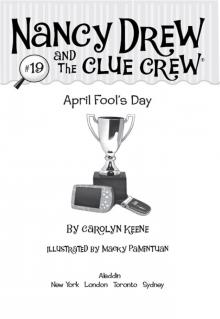 April Fool's Day
April Fool's Day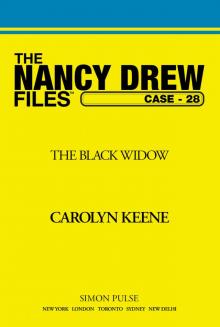 The Black Widow
The Black Widow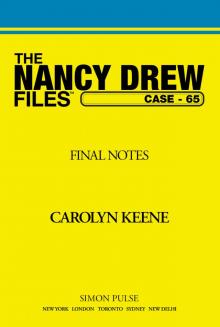 Final Notes
Final Notes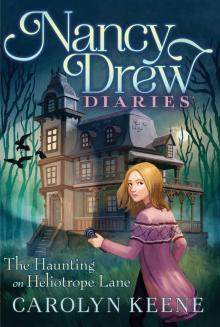 The Haunting on Heliotrope Lane
The Haunting on Heliotrope Lane The Runaway Bride
The Runaway Bride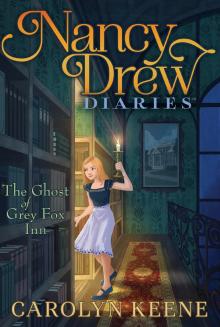 The Ghost of Grey Fox Inn
The Ghost of Grey Fox Inn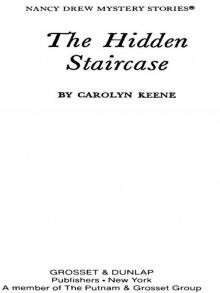 The Hidden Staircase
The Hidden Staircase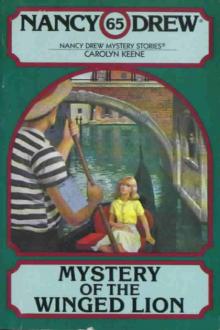 Mystery of the Winged Lion
Mystery of the Winged Lion Over the Edge
Over the Edge The Circus Scare
The Circus Scare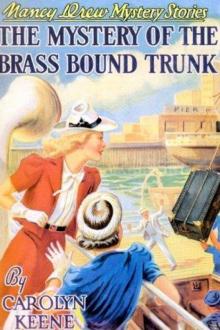 The Mystery of the Brass-Bound Trunk
The Mystery of the Brass-Bound Trunk Ski School Sneak
Ski School Sneak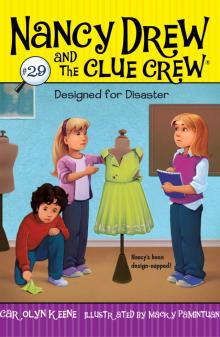 Designed for Disaster
Designed for Disaster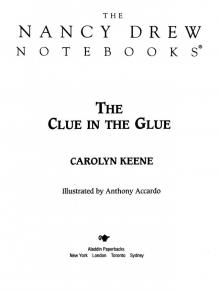 The Clue in the Glue
The Clue in the Glue Cold as Ice
Cold as Ice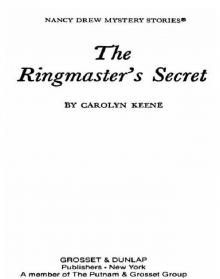 The Ringmaster's Secret
The Ringmaster's Secret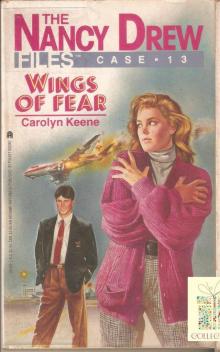 013 Wings of Fear
013 Wings of Fear The Secret of Shadow Ranch
The Secret of Shadow Ranch Not Nice on Ice
Not Nice on Ice Earth Day Escapade
Earth Day Escapade Mystery of Crocodile Island
Mystery of Crocodile Island The Bungalow Mystery
The Bungalow Mystery Power of Suggestion
Power of Suggestion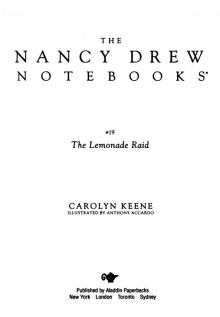 The Lemonade Raid
The Lemonade Raid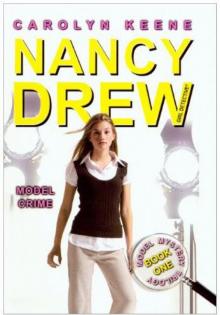 Model Crime
Model Crime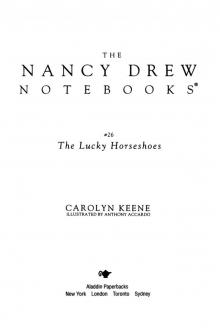 The Lucky Horseshoes
The Lucky Horseshoes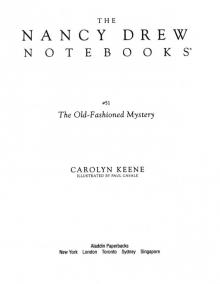 The Secret of the Old Clock
The Secret of the Old Clock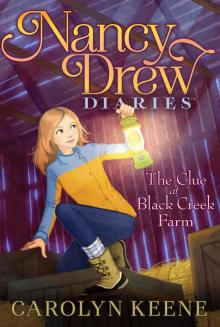 The Clue at Black Creek Farm
The Clue at Black Creek Farm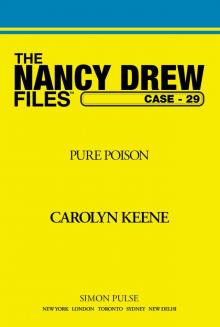 Pure Poison
Pure Poison Nobody's Business
Nobody's Business Wrong Track
Wrong Track Chick-Napped!
Chick-Napped!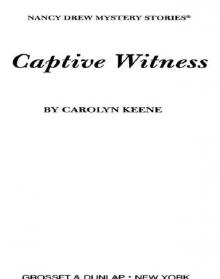 Captive Witness
Captive Witness If Looks Could Kill
If Looks Could Kill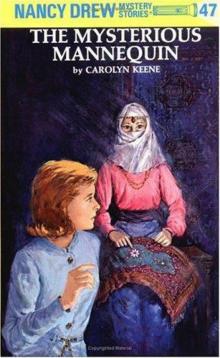 The Mysterious Mannequin
The Mysterious Mannequin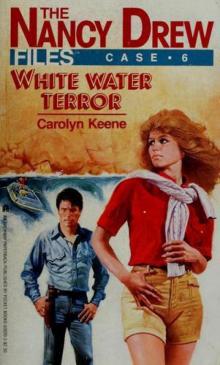 White Water Terror
White Water Terror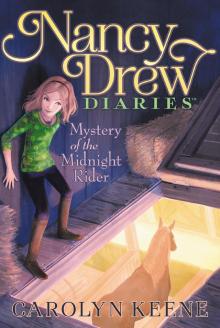 Mystery of the Midnight Rider
Mystery of the Midnight Rider Space Case
Space Case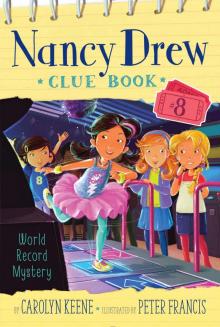 World Record Mystery
World Record Mystery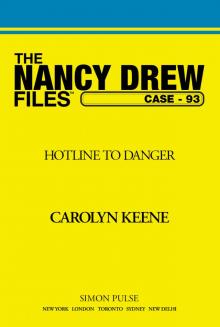 Hotline to Danger
Hotline to Danger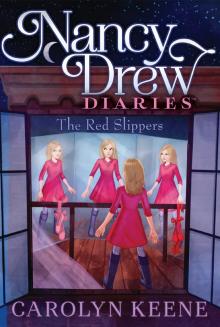 The Red Slippers
The Red Slippers A Crime for Christmas
A Crime for Christmas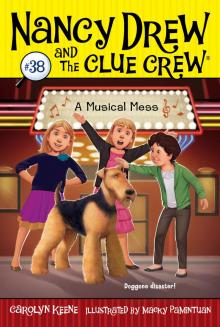 A Musical Mess
A Musical Mess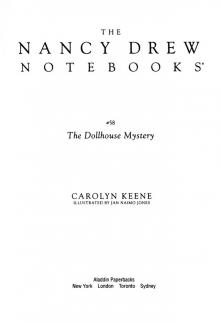 The Dollhouse Mystery
The Dollhouse Mystery Portrait in Crime
Portrait in Crime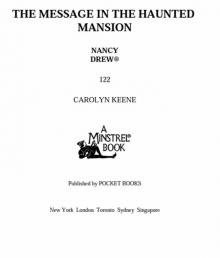 The Message in the Haunted Mansion
The Message in the Haunted Mansion Playing With Fire
Playing With Fire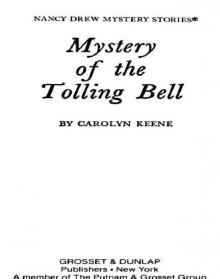 Mystery of the Tolling Bell
Mystery of the Tolling Bell Cutting Edge
Cutting Edge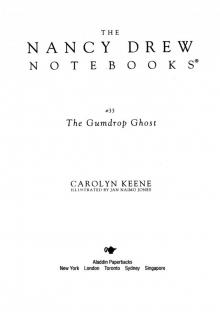 The Gumdrop Ghost
The Gumdrop Ghost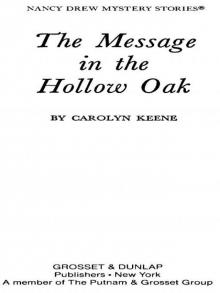 The Message in the Hollow Oak
The Message in the Hollow Oak Trial by Fire
Trial by Fire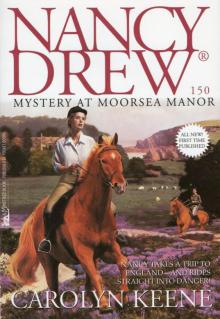 Mystery at Moorsea Manor
Mystery at Moorsea Manor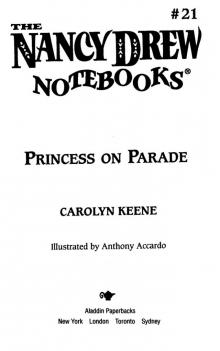 Princess on Parade
Princess on Parade The Flying Saucer Mystery
The Flying Saucer Mystery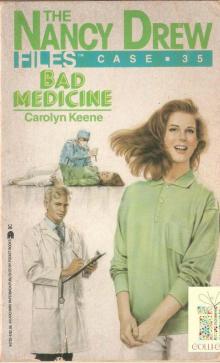 035 Bad Medicine
035 Bad Medicine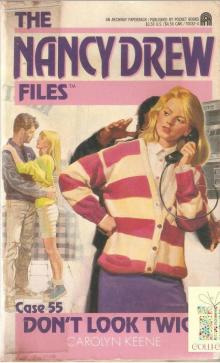 055 Don't Look Twice
055 Don't Look Twice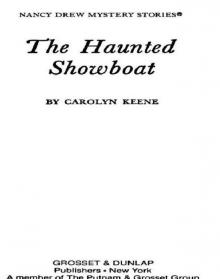 The Haunted Showboat
The Haunted Showboat Out of Bounds
Out of Bounds Choosing Sides
Choosing Sides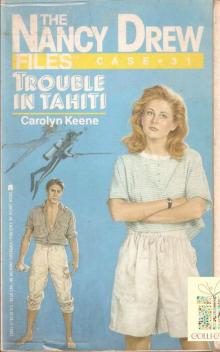 031 Trouble in Tahiti
031 Trouble in Tahiti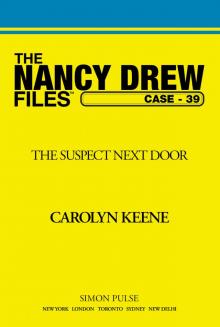 The Suspect Next Door
The Suspect Next Door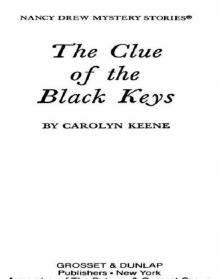 The Clue of the Black Keys
The Clue of the Black Keys The Secret Santa
The Secret Santa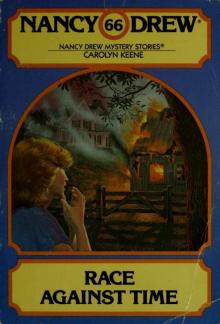 Race Against Time
Race Against Time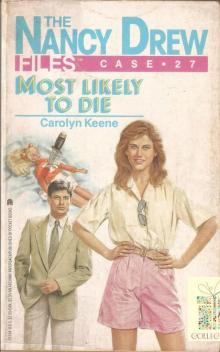 027 Most Likely to Die
027 Most Likely to Die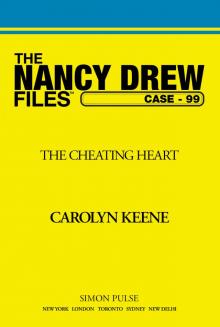 The Cheating Heart
The Cheating Heart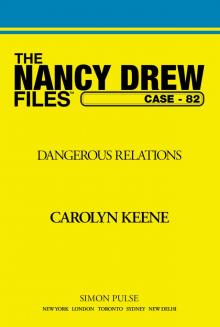 Dangerous Relations
Dangerous Relations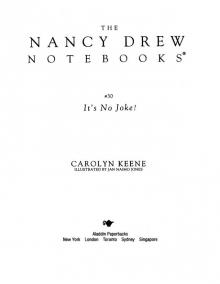 It's No Joke!
It's No Joke!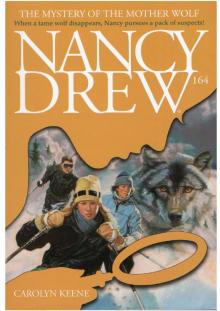 The Mystery of the Mother Wolf
The Mystery of the Mother Wolf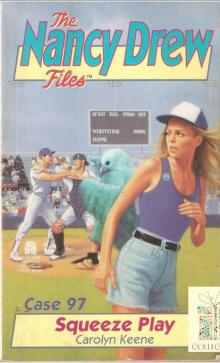 097 Squeeze Play
097 Squeeze Play Secret at Mystic Lake
Secret at Mystic Lake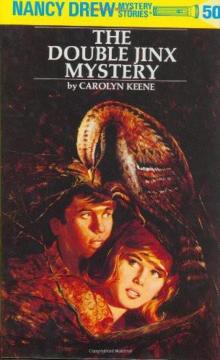 The Double Jinx Mystery
The Double Jinx Mystery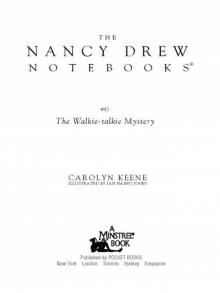 The Walkie Talkie Mystery
The Walkie Talkie Mystery The Case of the Vanishing Veil
The Case of the Vanishing Veil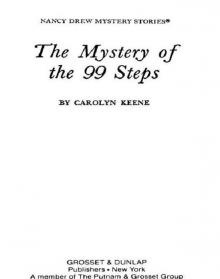 The Mystery of the 99 Steps
The Mystery of the 99 Steps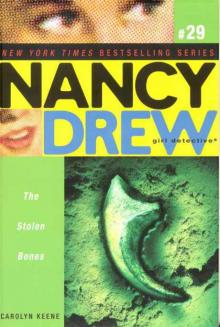 The Stolen Bones
The Stolen Bones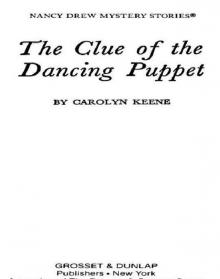 The Clue of the Dancing Puppet
The Clue of the Dancing Puppet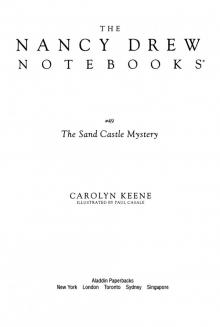 The Sand Castle Mystery
The Sand Castle Mystery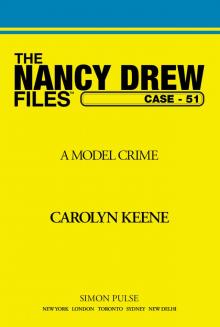 A Model Crime
A Model Crime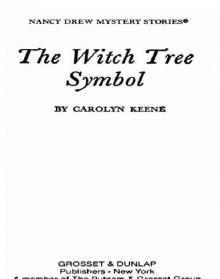 The Witch Tree Symbol
The Witch Tree Symbol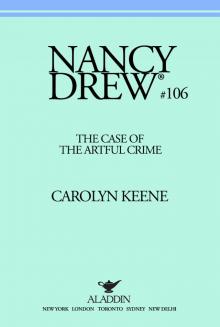 The Case of the Artful Crime
The Case of the Artful Crime Mall Madness
Mall Madness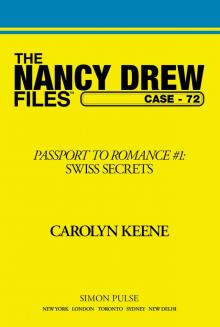 Swiss Secrets
Swiss Secrets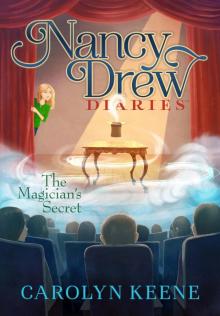 The Magician's Secret
The Magician's Secret Tall, Dark and Deadly
Tall, Dark and Deadly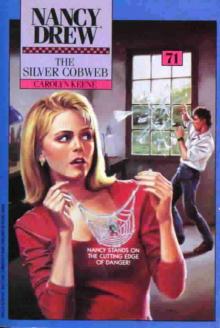 The Silver Cobweb
The Silver Cobweb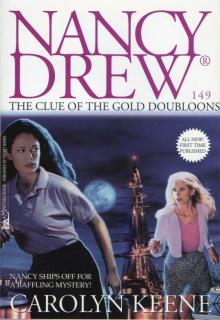 The Clue of the Gold Doubloons
The Clue of the Gold Doubloons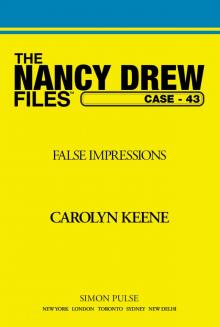 False Impressions
False Impressions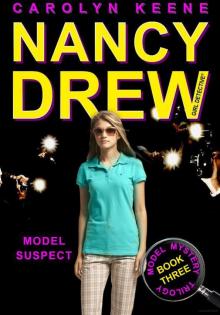 Model Suspect
Model Suspect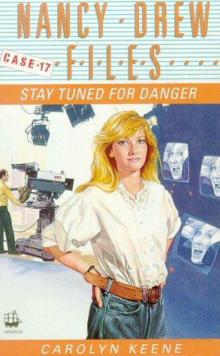 Stay Tuned for Danger
Stay Tuned for Danger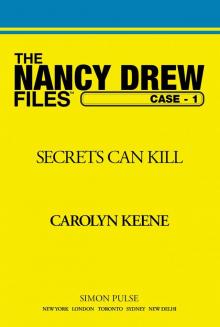 Secrets Can Kill
Secrets Can Kill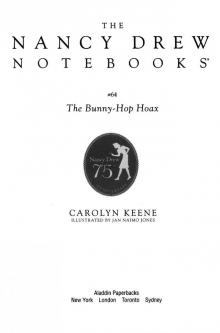 The Bunny-Hop Hoax
The Bunny-Hop Hoax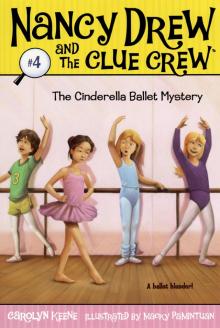 The Cinderella Ballet Mystery
The Cinderella Ballet Mystery The Secret at Solaire
The Secret at Solaire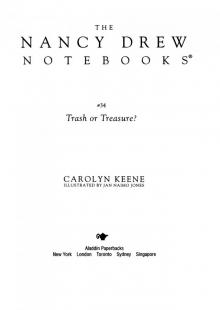 Trash or Treasure?
Trash or Treasure? The Missing Horse Mystery
The Missing Horse Mystery The Lost Locket
The Lost Locket The Secret of the Wooden Lady
The Secret of the Wooden Lady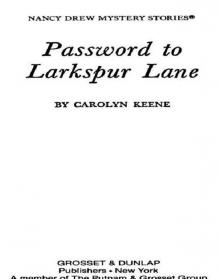 Password to Larkspur Lane
Password to Larkspur Lane Movie Madness
Movie Madness A Secret in Time
A Secret in Time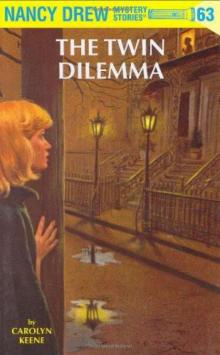 The Twin Dilemma
The Twin Dilemma Candy Is Dandy
Candy Is Dandy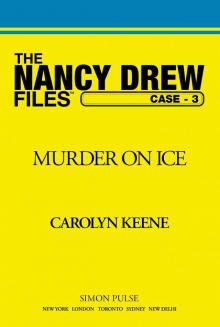 Murder on Ice
Murder on Ice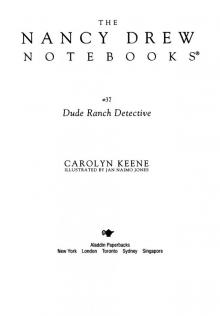 Dude Ranch Detective
Dude Ranch Detective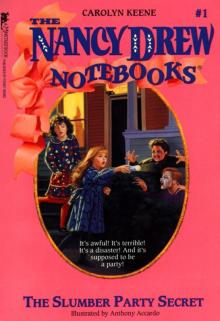 The Slumber Party Secret
The Slumber Party Secret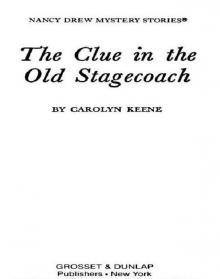 The Clue in the Old Stagecoach
The Clue in the Old Stagecoach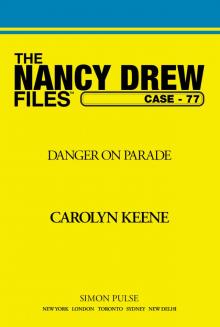 Danger on Parade
Danger on Parade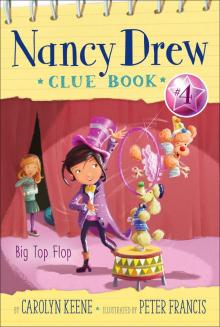 Big Top Flop
Big Top Flop Strangers on a Train
Strangers on a Train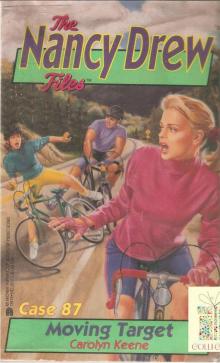 087 Moving Target
087 Moving Target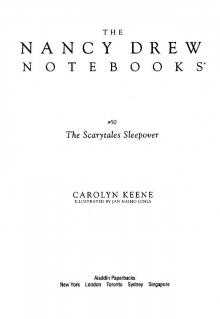 The Scarytales Sleepover
The Scarytales Sleepover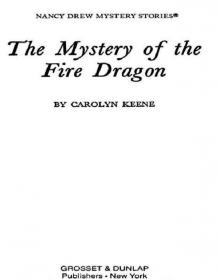 The Mystery of the Fire Dragon
The Mystery of the Fire Dragon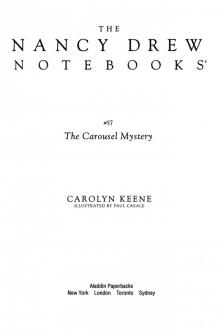 The Carousel Mystery
The Carousel Mystery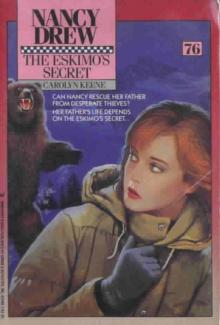 The Eskimo's Secret
The Eskimo's Secret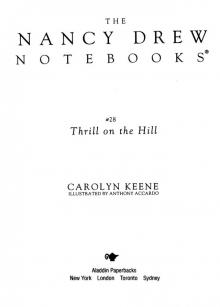 Thrill on the Hill
Thrill on the Hill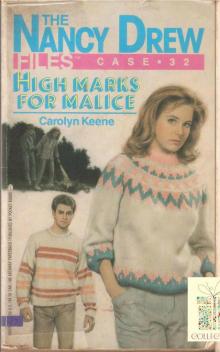 032 High Marks for Malice
032 High Marks for Malice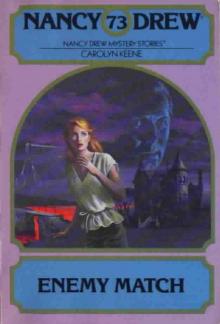 Enemy Match
Enemy Match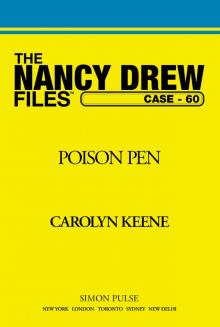 Poison Pen
Poison Pen Lights, Camera . . . Cats!
Lights, Camera . . . Cats! Lost in the Everglades
Lost in the Everglades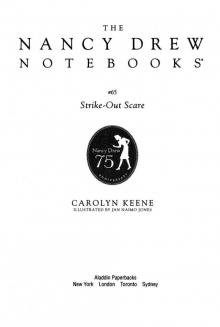 Strike-Out Scare
Strike-Out Scare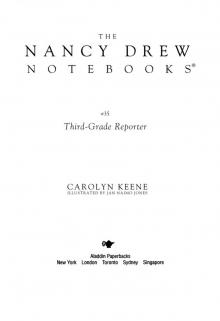 Third-Grade Reporter
Third-Grade Reporter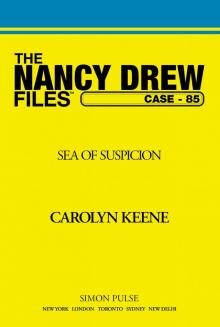 Sea of Suspicion
Sea of Suspicion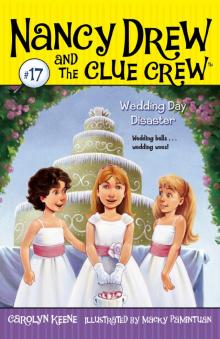 Wedding Day Disaster
Wedding Day Disaster The Make-A-Pet Mystery
The Make-A-Pet Mystery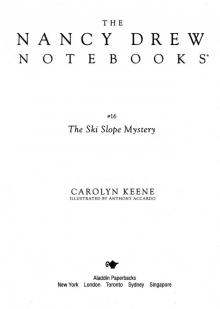 The Ski Slope Mystery
The Ski Slope Mystery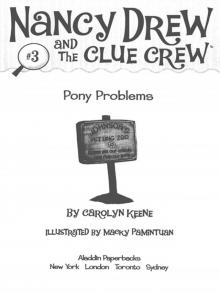 Pony Problems
Pony Problems Candy Kingdom Chaos
Candy Kingdom Chaos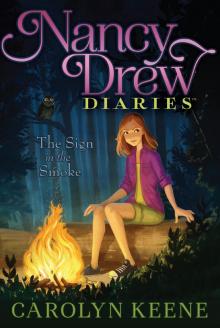 The Sign in the Smoke
The Sign in the Smoke The Wrong Chemistry
The Wrong Chemistry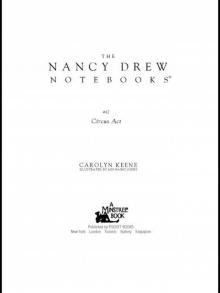 Circus Act
Circus Act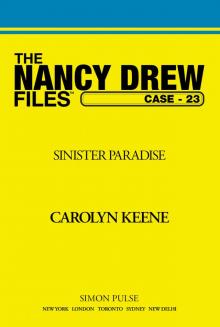 Sinister Paradise
Sinister Paradise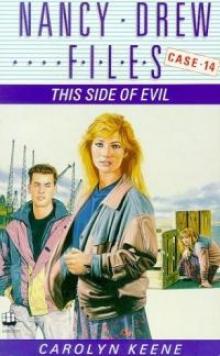 This Side of Evil
This Side of Evil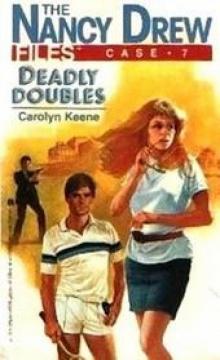 Deadly Doubles
Deadly Doubles The Mystery of the Masked Rider
The Mystery of the Masked Rider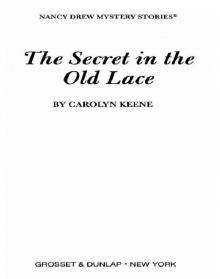 The Secret in the Old Lace
The Secret in the Old Lace The Pen Pal Puzzle
The Pen Pal Puzzle Without a Trace
Without a Trace Whose Pet Is Best?
Whose Pet Is Best?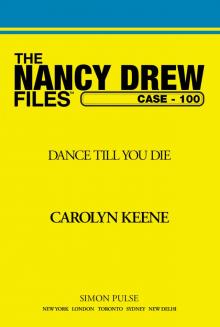 Dance Till You Die
Dance Till You Die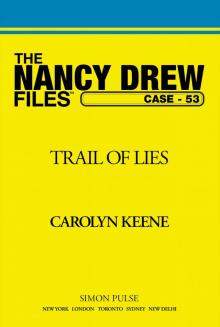 Trail of Lies
Trail of Lies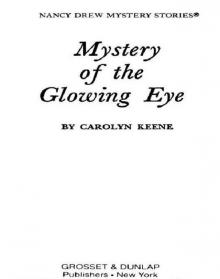 Mystery of the Glowing Eye
Mystery of the Glowing Eye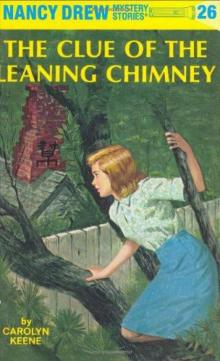 The Clue of the Leaning Chimney
The Clue of the Leaning Chimney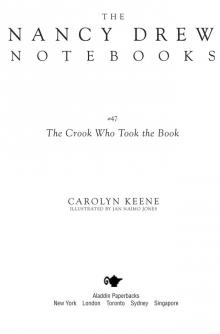 The Crook Who Took the Book
The Crook Who Took the Book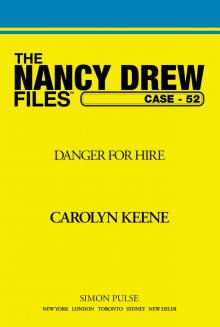 Danger for Hire
Danger for Hire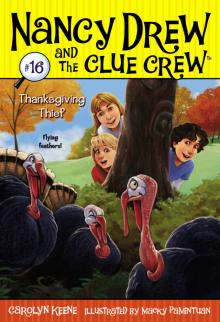 Thanksgiving Thief
Thanksgiving Thief Intruder!
Intruder!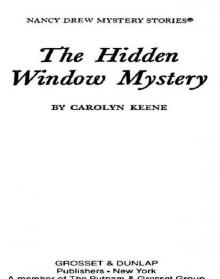 The Hidden Window Mystery
The Hidden Window Mystery Win, Place or Die
Win, Place or Die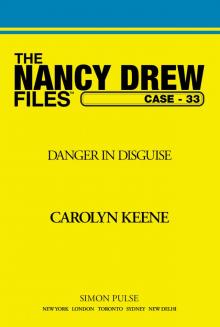 Danger in Disguise
Danger in Disguise The Best Detective
The Best Detective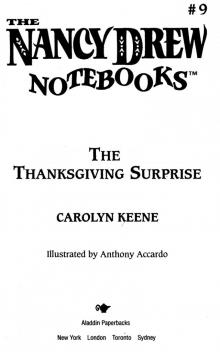 The Thanksgiving Surprise
The Thanksgiving Surprise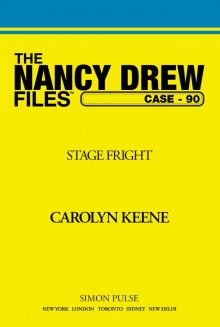 Stage Fright
Stage Fright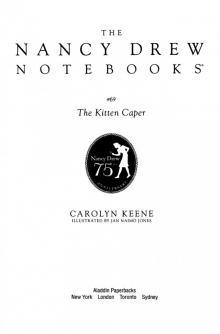 The Kitten Caper
The Kitten Caper Stolen Affections
Stolen Affections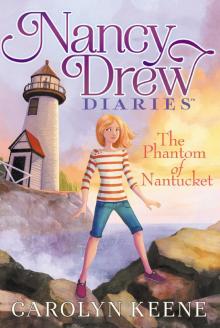 The Phantom of Nantucket
The Phantom of Nantucket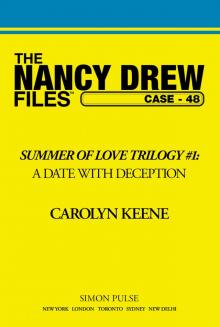 Date With Deception
Date With Deception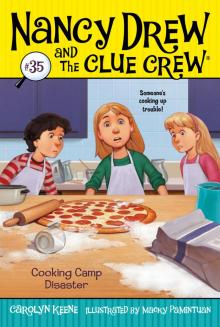 Cooking Camp Disaster
Cooking Camp Disaster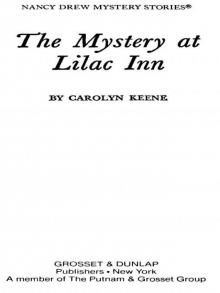 The Mystery at Lilac Inn
The Mystery at Lilac Inn Springtime Crime
Springtime Crime Action!
Action! Into Thin Air
Into Thin Air The Chocolate-Covered Contest
The Chocolate-Covered Contest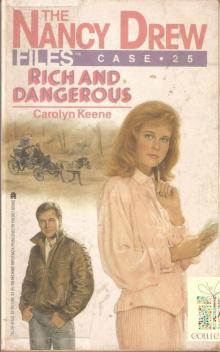 025 Rich and Dangerous
025 Rich and Dangerous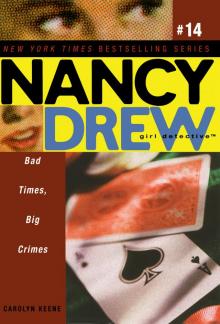 Bad Times, Big Crimes
Bad Times, Big Crimes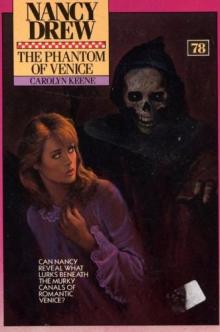 078 The Phantom Of Venice
078 The Phantom Of Venice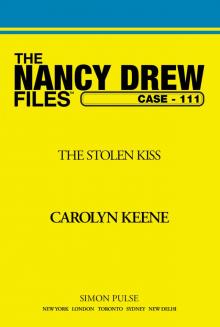 The Stolen Kiss
The Stolen Kiss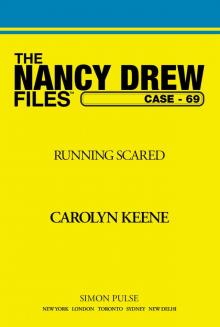 Running Scared
Running Scared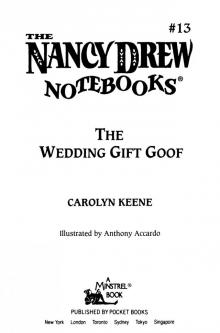 The Wedding Gift Goof
The Wedding Gift Goof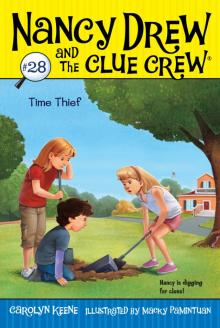 Time Thief
Time Thief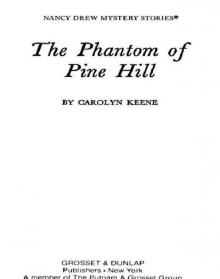 The Phantom of Pine Hill
The Phantom of Pine Hill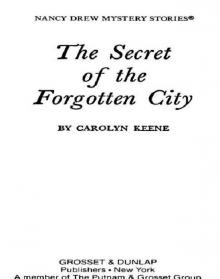 The Secret of the Forgotten City
The Secret of the Forgotten City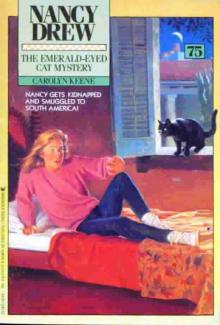 The Emerald-Eyed Cat Mystery
The Emerald-Eyed Cat Mystery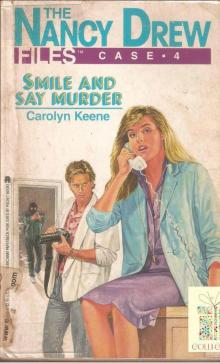 004 Smile and Say Murder
004 Smile and Say Murder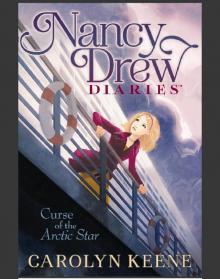 Curse of the Arctic Star
Curse of the Arctic Star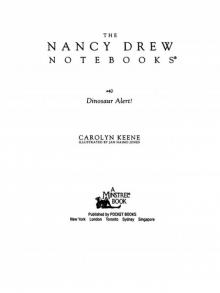 Dinosaur Alert!
Dinosaur Alert!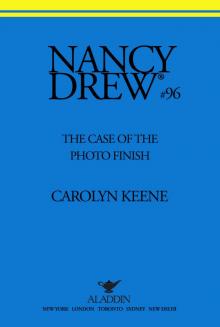 The Case of the Photo Finish
The Case of the Photo Finish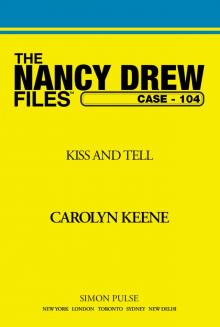 Kiss and Tell
Kiss and Tell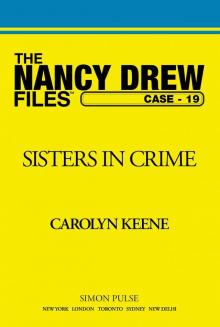 Sisters in Crime
Sisters in Crime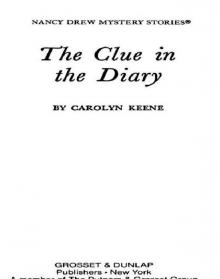 The Clue in the Diary
The Clue in the Diary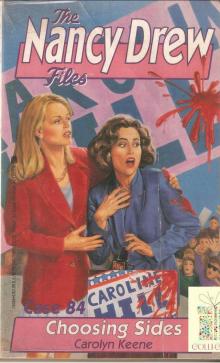 084 Choosing Sides
084 Choosing Sides Haunting of Horse Island
Haunting of Horse Island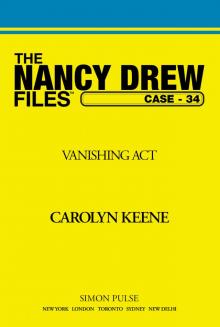 Vanishing Act
Vanishing Act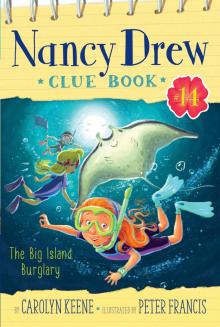 The Big Island Burglary
The Big Island Burglary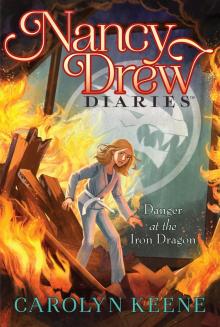 Danger at the Iron Dragon
Danger at the Iron Dragon Pets on Parade
Pets on Parade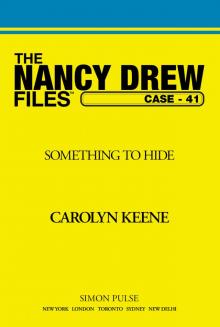 Something to Hide
Something to Hide The Strange Message in the Parchment
The Strange Message in the Parchment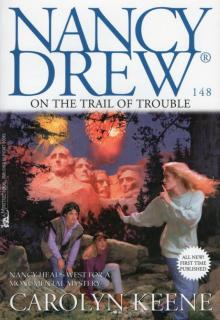 On the Trail of Trouble
On the Trail of Trouble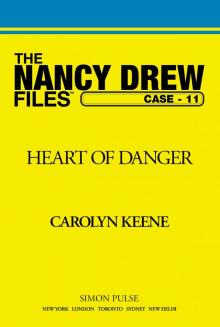 Heart of Danger
Heart of Danger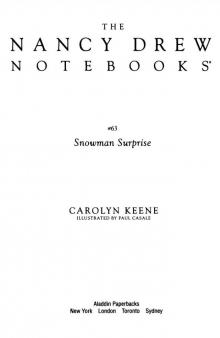 The Snowman Surprise
The Snowman Surprise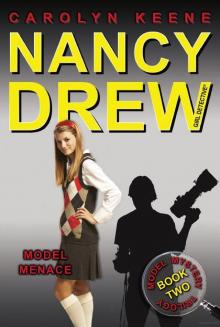 Model Menace
Model Menace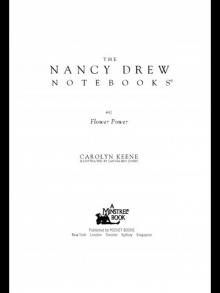 Flower Power
Flower Power The Great Goat Gaffe
The Great Goat Gaffe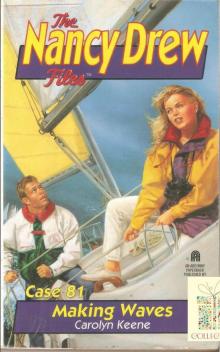 081 Making Waves
081 Making Waves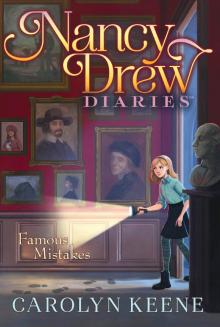 Famous Mistakes
Famous Mistakes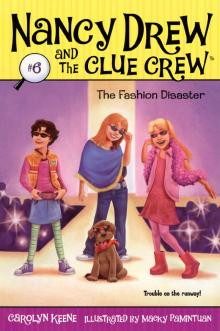 The Fashion Disaster
The Fashion Disaster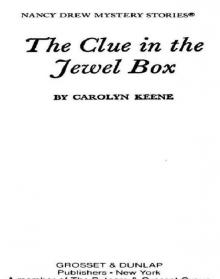 The Clue in the Jewel Box
The Clue in the Jewel Box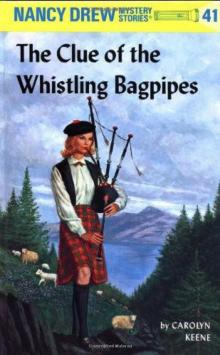 The Clue of the Whistling Bagpipes
The Clue of the Whistling Bagpipes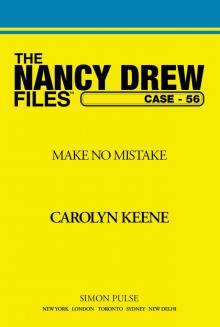 Make No Mistake
Make No Mistake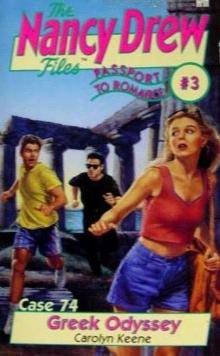 Greek Odyssey
Greek Odyssey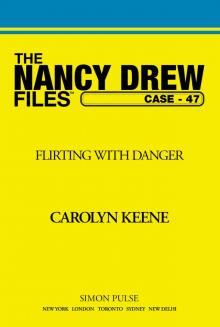 Flirting With Danger
Flirting With Danger Double Take
Double Take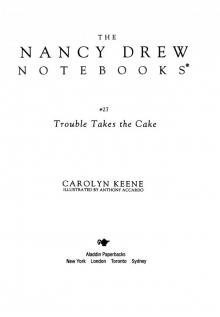 Trouble Takes the Cake
Trouble Takes the Cake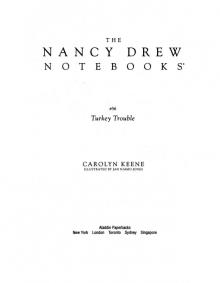 Turkey Trouble
Turkey Trouble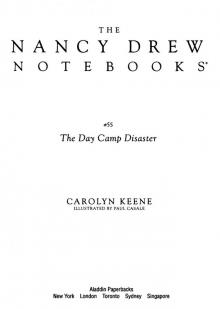 The Day Camp Disaster
The Day Camp Disaster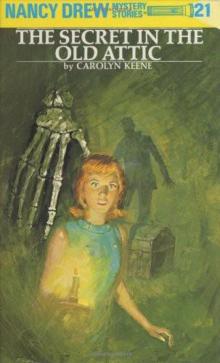 The Secret in the Old Attic
The Secret in the Old Attic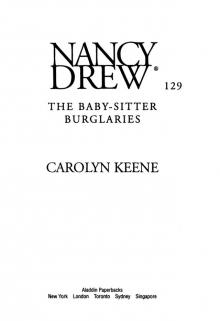 The Baby-Sitter Burglaries
The Baby-Sitter Burglaries Recipe for Murder
Recipe for Murder The Secret of the Scarecrow
The Secret of the Scarecrow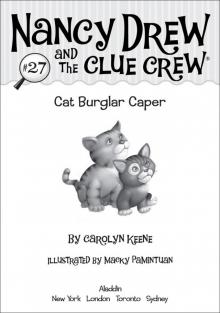 Cat Burglar Caper
Cat Burglar Caper Turkey Trot Plot
Turkey Trot Plot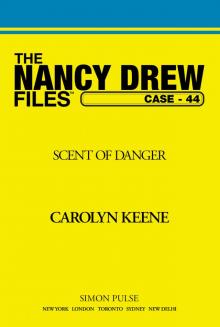 Scent of Danger
Scent of Danger The Clue in the Crossword Cipher
The Clue in the Crossword Cipher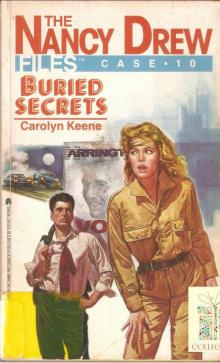 010 Buried Secrets
010 Buried Secrets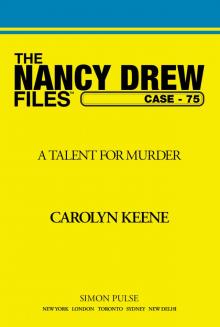 A Talent for Murder
A Talent for Murder The Triple Hoax
The Triple Hoax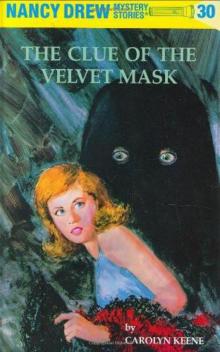 The Clue of the Velvet Mask
The Clue of the Velvet Mask Last Lemonade Standing
Last Lemonade Standing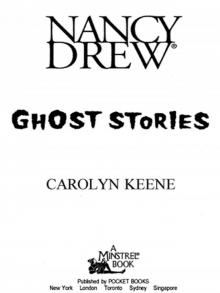 The Ghost of Blackwood Hall
The Ghost of Blackwood Hall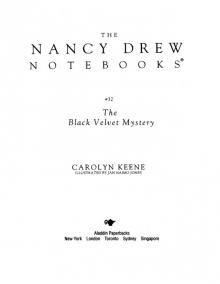 The Black Velvet Mystery
The Black Velvet Mystery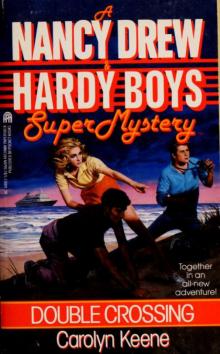 Double Crossing
Double Crossing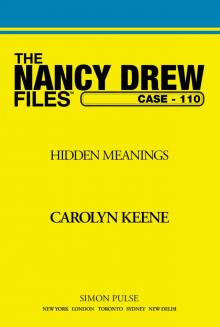 Hidden Meanings
Hidden Meanings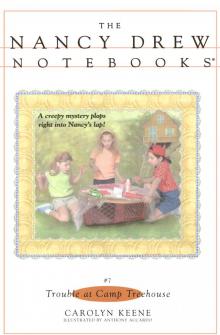 Trouble at Camp Treehouse
Trouble at Camp Treehouse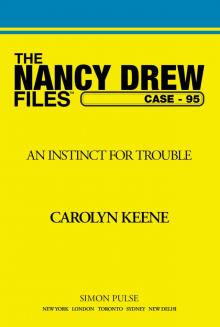 An Instinct for Trouble
An Instinct for Trouble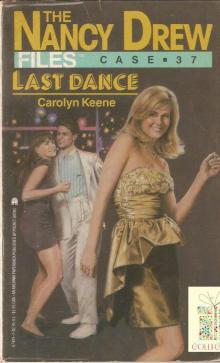 037 Last Dance
037 Last Dance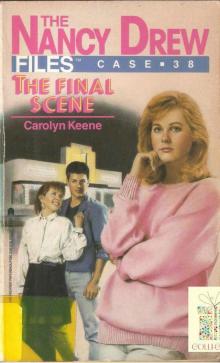 038 The Final Scene
038 The Final Scene Duck Derby Debacle
Duck Derby Debacle The Pumpkin Patch Puzzle
The Pumpkin Patch Puzzle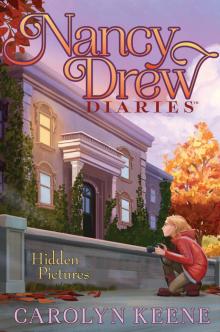 Hidden Pictures
Hidden Pictures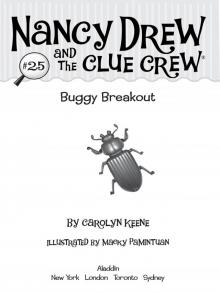 Buggy Breakout
Buggy Breakout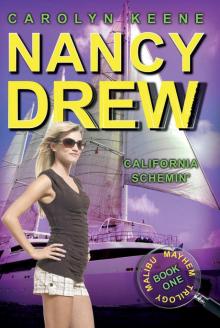 California Schemin'
California Schemin'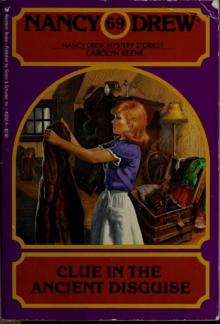 Clue in the Ancient Disguise
Clue in the Ancient Disguise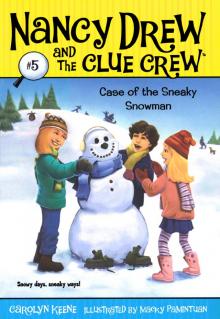 Case of the Sneaky Snowman
Case of the Sneaky Snowman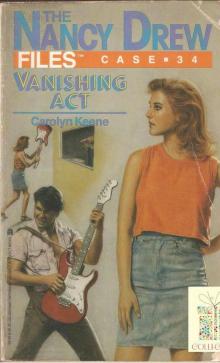 034 Vanishing Act
034 Vanishing Act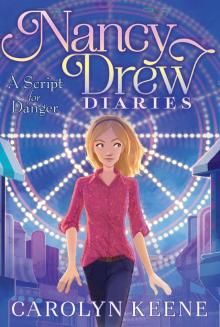 A Script for Danger
A Script for Danger The Flower Show Fiasco
The Flower Show Fiasco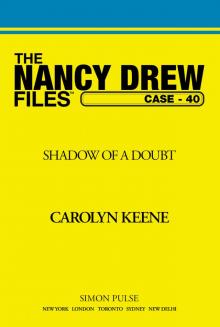 Shadow of a Doubt
Shadow of a Doubt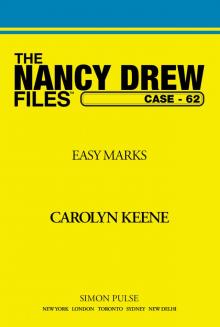 Easy Marks
Easy Marks Alien in the Classroom
Alien in the Classroom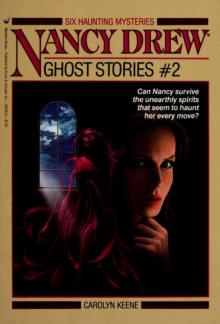 Ghost Stories, #2 (Nancy Drew)
Ghost Stories, #2 (Nancy Drew) The Bike Race Mystery
The Bike Race Mystery False Pretenses
False Pretenses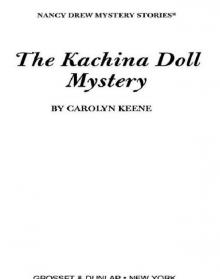 The Kachina Doll Mystery
The Kachina Doll Mystery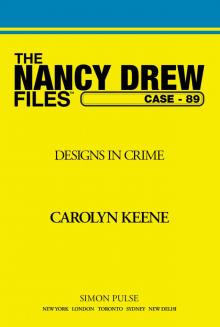 Designs in Crime
Designs in Crime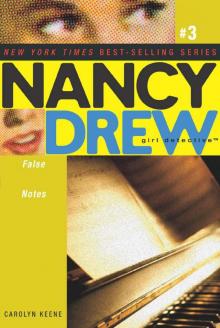 False Notes
False Notes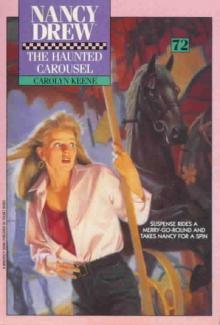 The Haunted Carousel
The Haunted Carousel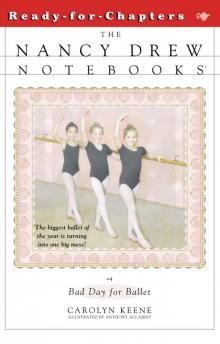 Bad Day for Ballet
Bad Day for Ballet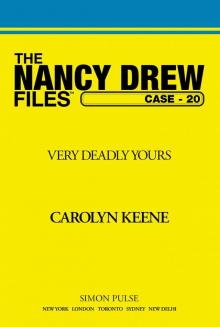 Very Deadly Yours
Very Deadly Yours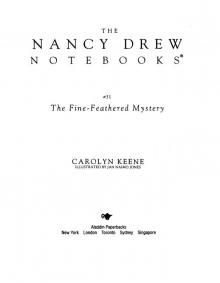 The Fine-Feathered Mystery
The Fine-Feathered Mystery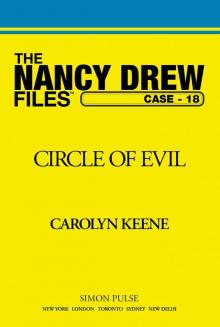 Circle of Evil
Circle of Evil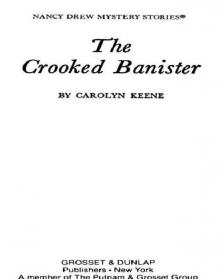 The Crooked Banister
The Crooked Banister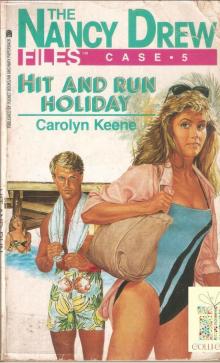 005 Hit and Run Holiday
005 Hit and Run Holiday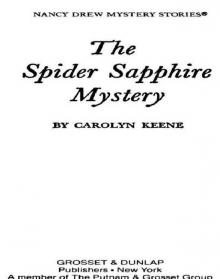 The Spider Sapphire Mystery
The Spider Sapphire Mystery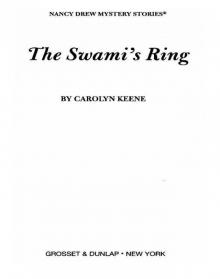 The Swami's Ring
The Swami's Ring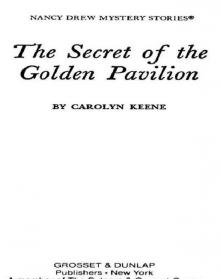 The Secret of the Golden Pavilion
The Secret of the Golden Pavilion Recipe for Trouble
Recipe for Trouble Betrayed by Love
Betrayed by Love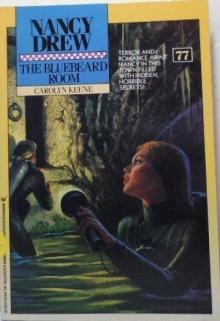 The Bluebeard Room
The Bluebeard Room Sweet Revenge
Sweet Revenge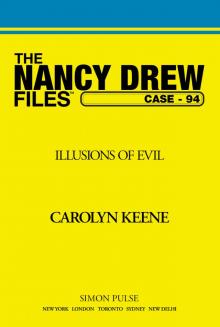 Illusions of Evil
Illusions of Evil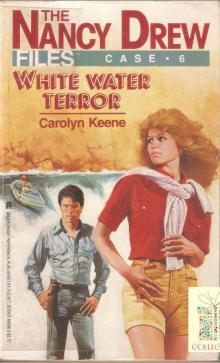 006 White Water Terror
006 White Water Terror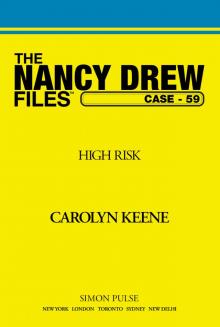 High Risk
High Risk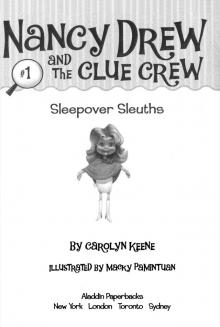 Sleepover Sleuths
Sleepover Sleuths The Clue on the Crystal Dove
The Clue on the Crystal Dove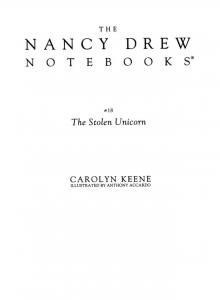 The Stolen Unicorn
The Stolen Unicorn The Professor and the Puzzle
The Professor and the Puzzle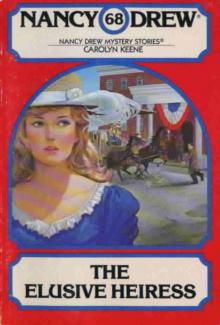 The Elusive Heiress
The Elusive Heiress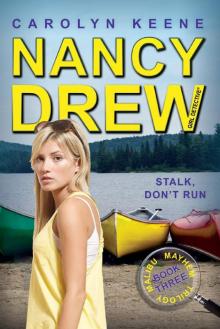 Stalk, Don't Run
Stalk, Don't Run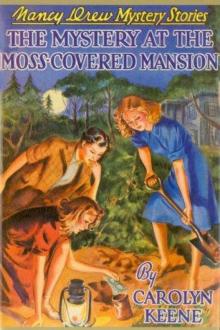 The Mystery at the Moss-Covered Mansion
The Mystery at the Moss-Covered Mansion The Tortoise and the Scare
The Tortoise and the Scare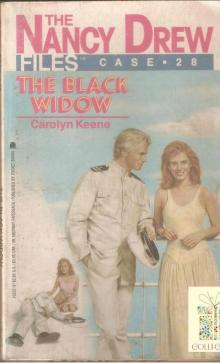 028 The Black Widow
028 The Black Widow Big Worry in Wonderland
Big Worry in Wonderland Crosscurrents
Crosscurrents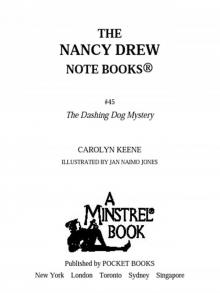 The Dashing Dog Mystery
The Dashing Dog Mystery Fatal Attraction
Fatal Attraction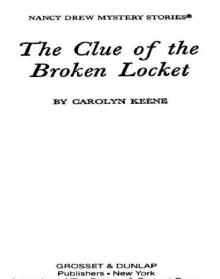 The Clue of the Broken Locket
The Clue of the Broken Locket The Stinky Cheese Surprise
The Stinky Cheese Surprise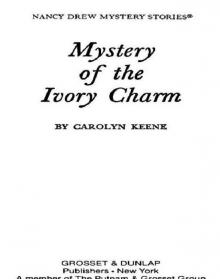 Mystery of the Ivory Charm
Mystery of the Ivory Charm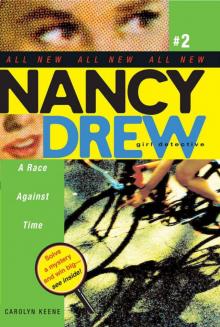 A Race Against Time
A Race Against Time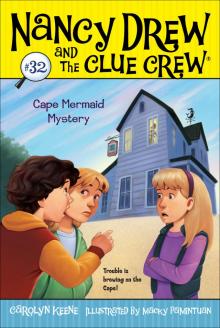 Cape Mermaid Mystery
Cape Mermaid Mystery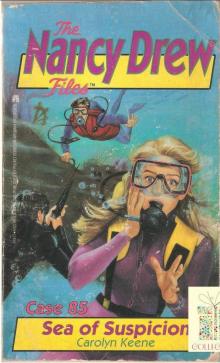 085 Sea of Suspicion
085 Sea of Suspicion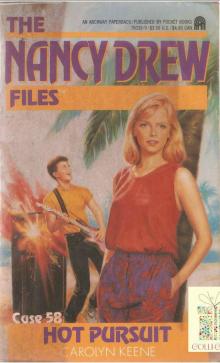 058 Hot Pursuit
058 Hot Pursuit The Secret in the Spooky Woods
The Secret in the Spooky Woods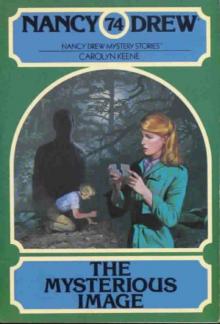 The Mysterious Image
The Mysterious Image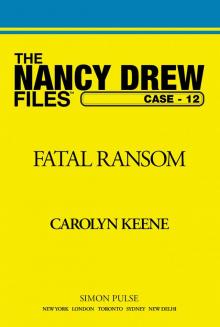 Fatal Ransom
Fatal Ransom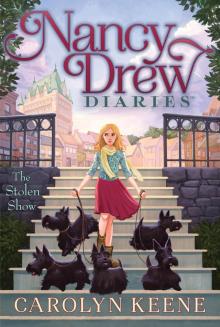 The Stolen Show
The Stolen Show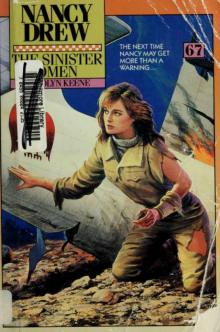 The Sinister Omen
The Sinister Omen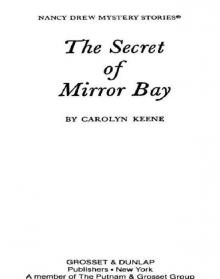 The Secret of Mirror Bay
The Secret of Mirror Bay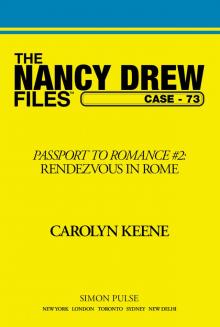 Rendezvous in Rome
Rendezvous in Rome The Perfect Plot
The Perfect Plot The Mystery of Misty Canyon
The Mystery of Misty Canyon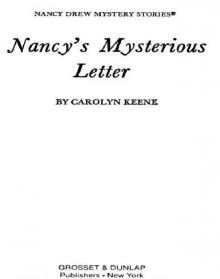 Nancy's Mysterious Letter
Nancy's Mysterious Letter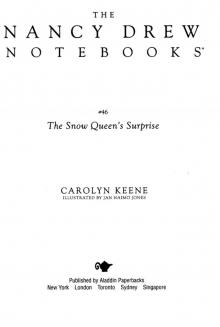 The Snow Queen's Surprise
The Snow Queen's Surprise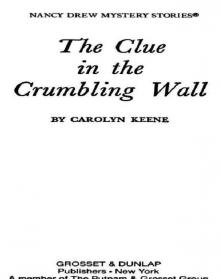 The Clue in the Crumbling Wall
The Clue in the Crumbling Wall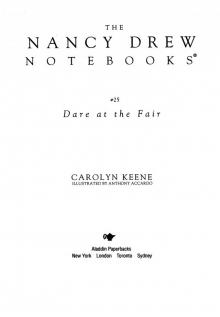 Dare at the Fair
Dare at the Fair Scream for Ice Cream
Scream for Ice Cream A Star Witness
A Star Witness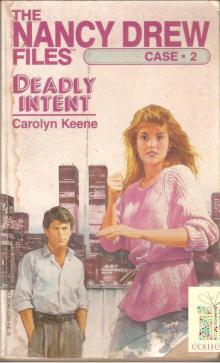 002 Deadly Intent
002 Deadly Intent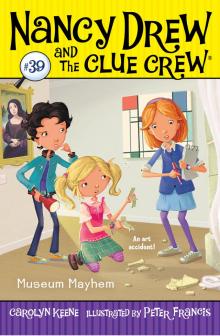 Museum Mayhem
Museum Mayhem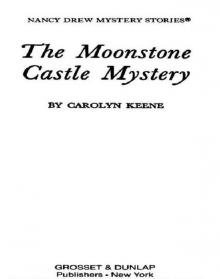 The Moonstone Castle Mystery
The Moonstone Castle Mystery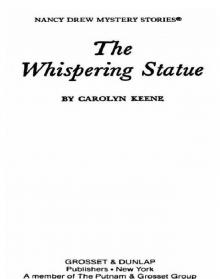 The Whispering Statue
The Whispering Statue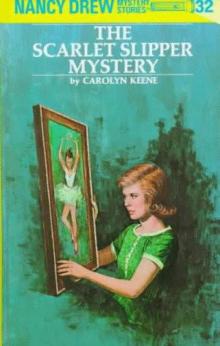 The Scarlet Slipper Mystery
The Scarlet Slipper Mystery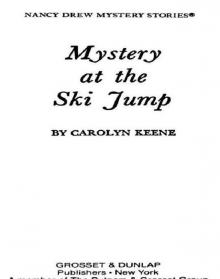 Mystery at the Ski Jump
Mystery at the Ski Jump Hot Pursuit
Hot Pursuit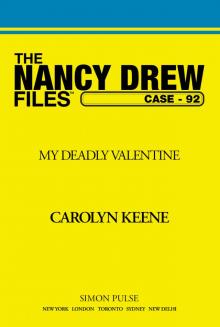 My Deadly Valentine
My Deadly Valentine The Silent Suspect
The Silent Suspect Deep Secrets
Deep Secrets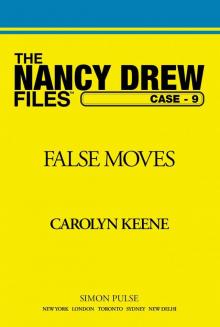 False Moves
False Moves The Zoo Crew
The Zoo Crew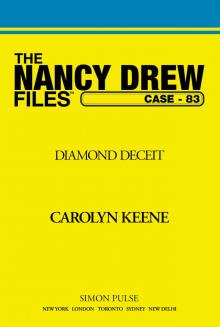 Diamond Deceit
Diamond Deceit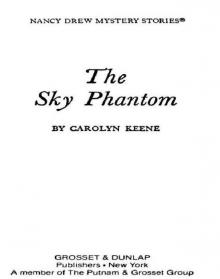 The Sky Phantom
The Sky Phantom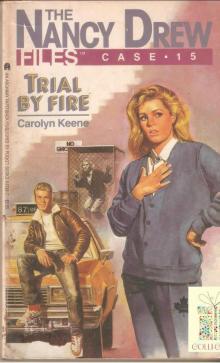 015 Trial by Fire
015 Trial by Fire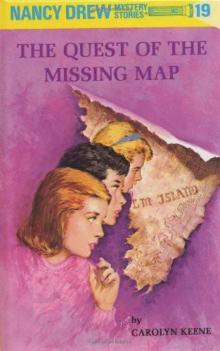 The Quest of the Missing Map
The Quest of the Missing Map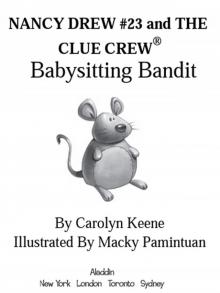 Babysitting Bandit
Babysitting Bandit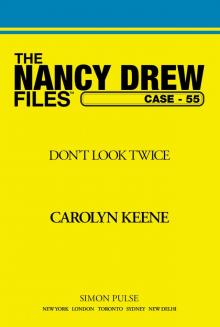 Don't Look Twice
Don't Look Twice Never Say Die
Never Say Die The Soccer Shoe Clue
The Soccer Shoe Clue Pool Party Puzzler
Pool Party Puzzler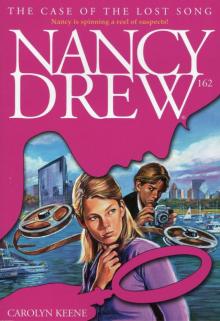 The Case of the Lost Song
The Case of the Lost Song The Apple Bandit
The Apple Bandit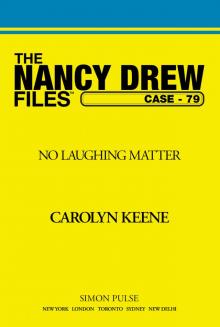 No Laughing Matter
No Laughing Matter The Thirteenth Pearl
The Thirteenth Pearl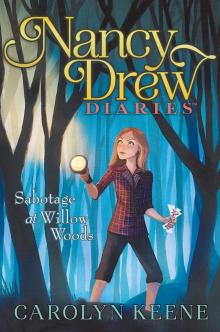 Sabotage at Willow Woods
Sabotage at Willow Woods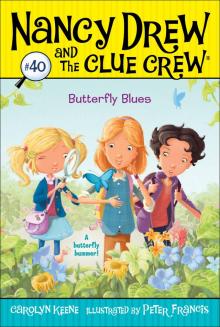 Butterfly Blues
Butterfly Blues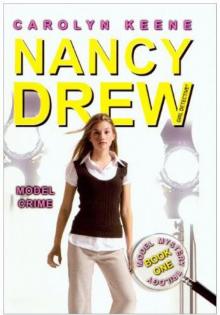 Model Crime 1
Model Crime 1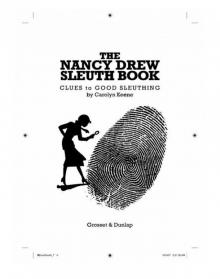 The Nancy Drew Sleuth Book
The Nancy Drew Sleuth Book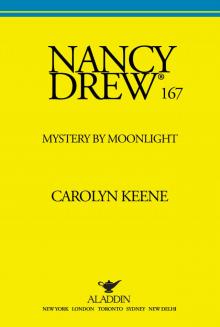 Mystery by Moonlight
Mystery by Moonlight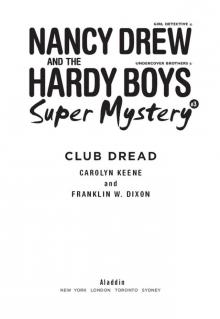 Club Dread
Club Dread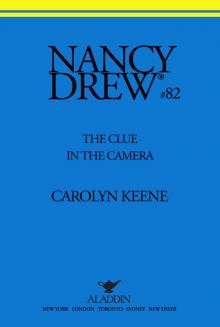 The Clue in the Camera
The Clue in the Camera 118 Betrayed By Love
118 Betrayed By Love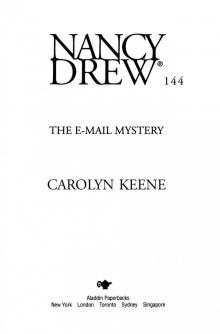 The E-Mail Mystery (Nancy Drew Book 144)
The E-Mail Mystery (Nancy Drew Book 144)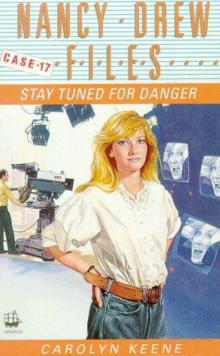 Stay Tuned for Danger: Circle of Evil
Stay Tuned for Danger: Circle of Evil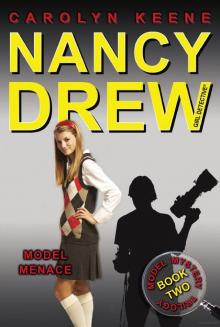 Model Menace 2
Model Menace 2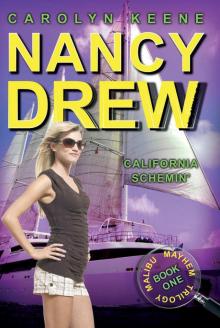 California Schemin': Book One in the Malibu Mayhem Trilogy
California Schemin': Book One in the Malibu Mayhem Trilogy Zoo Clue (Nancy Drew Notebooks)
Zoo Clue (Nancy Drew Notebooks)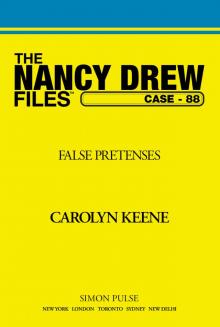 False Pretences
False Pretences 151 The Chocolate-Covered Contest
151 The Chocolate-Covered Contest Close Encounters
Close Encounters The Emeral-Eyed Cat Mystery
The Emeral-Eyed Cat Mystery Boo Crew
Boo Crew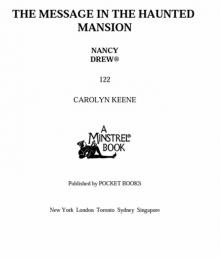 The Message in the Haunted Mansion (Nancy Drew Book 122)
The Message in the Haunted Mansion (Nancy Drew Book 122) A Nancy Drew Christmas
A Nancy Drew Christmas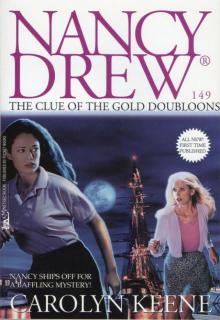 149 The Clue Of The Gold Doubloons
149 The Clue Of The Gold Doubloons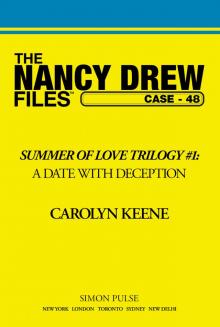 A Date with Deception
A Date with Deception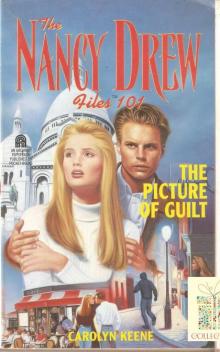 101 The Picture of Guilt
101 The Picture of Guilt The Secret in the Spooky Woods (Nancy Drew Notebooks Book 62)
The Secret in the Spooky Woods (Nancy Drew Notebooks Book 62) The Wrong Track
The Wrong Track Lights! Camera! Clues!
Lights! Camera! Clues!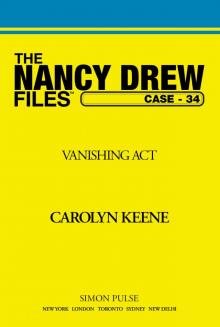 The Vanishing Act
The Vanishing Act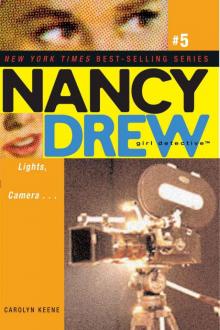 Lights, Camera . . .
Lights, Camera . . .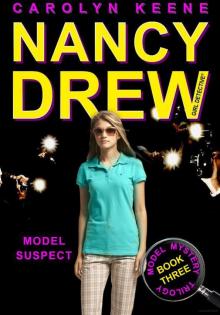 Model Suspect 3
Model Suspect 3 160 The Clue On The Crystal Dove
160 The Clue On The Crystal Dove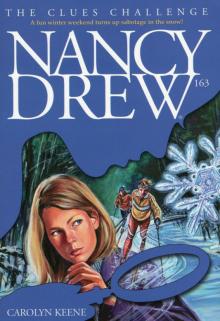 163 The Clues Challenge
163 The Clues Challenge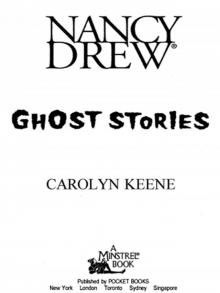 Ghost Stories (Nancy Drew)
Ghost Stories (Nancy Drew) Space Case (Nancy Drew Notebooks Book 61)
Space Case (Nancy Drew Notebooks Book 61)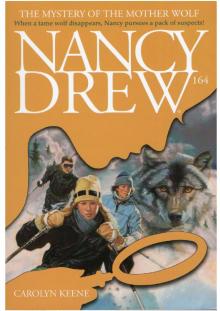 164 The Mystery Of The Mother Wolf
164 The Mystery Of The Mother Wolf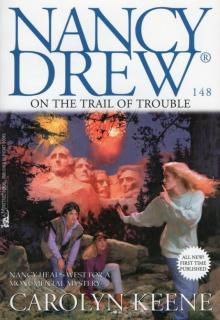 148 On The Trail Of Trouble
148 On The Trail Of Trouble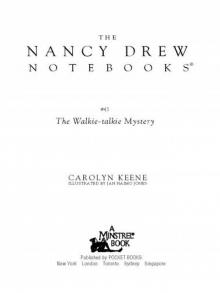 The Walkie-Talkie Mystery
The Walkie-Talkie Mystery The E-Mail Mystery
The E-Mail Mystery Intruder (Nancy Drew (All New) Girl Detective)
Intruder (Nancy Drew (All New) Girl Detective)![The Stolen Relic [Nancy Drew Girl Detective 007] Read online](http://i1.bookreadfree.com/i2/04/11/the_stolen_relic_nancy_drew_girl_detective_007_preview.jpg) The Stolen Relic [Nancy Drew Girl Detective 007]
The Stolen Relic [Nancy Drew Girl Detective 007] 105 Stolen Affections
105 Stolen Affections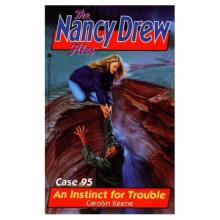 An Instict for Trouble
An Instict for Trouble 161 Lost In The Everglades
161 Lost In The Everglades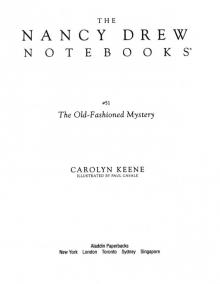 The Old-Fashioned Mystery
The Old-Fashioned Mystery Perfect Plot
Perfect Plot